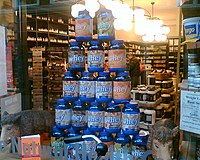
Photo from wikipedia
Short periods of muscle disuse result in substantial skeletal muscle atrophy. Recently, we showed that both neuromuscular electrical stimulation (NMES) as well as presleep dietary protein ingestion represent effective strategies… Click to show full abstract
Short periods of muscle disuse result in substantial skeletal muscle atrophy. Recently, we showed that both neuromuscular electrical stimulation (NMES) as well as presleep dietary protein ingestion represent effective strategies to stimulate muscle protein synthesis rates. In this study, we test our hypothesis that NMES can augment the use of presleep protein-derived amino acids for overnight muscle protein synthesis in older men. Twenty healthy, older [69 ± 1 (SE) yr] men were subjected to 24 h of bed rest, starting at 8:00 AM. In the evening, volunteers were subjected to 70-min 1-legged NMES, while the other leg served as nonstimulated control (CON). Immediately following NMES, 40 g of intrinsically l-[1-13C]-phenylalanine labeled protein was ingested prior to sleep. Blood samples were taken throughout the night, and muscle biopsies were obtained from both legs in the evening and the following morning (8 h after protein ingestion) to assess dietary protein-derived l-[1-13C]-phenylalanine enrichments in myofibrillar protein. Plasma phenylalanine concentrations and plasma l-[1-13C]-phenylalanine enrichments increased significantly following protein ingestion and remained elevated for up to 6 h after protein ingestion (P < 0.05). During overnight sleep, myofibrillar protein-bound l-[1-13C]-phenylalanine enrichments (MPE) increased to a greater extent in the stimulated compared with the control leg (0.0344 ± 0.0019 vs. 0.0297 ± 0.0016 MPE, respectively; P < 0.01), representing 18 ± 6% greater incorporation of presleep protein-derived amino acids in the NMES compared with CON leg. In conclusion, application of NMES prior to presleep protein feeding stimulates the use of dietary protein-derived amino acids for overnight muscle protein synthesis in older men. NEW & NOTEWORTHY Neuromuscular electrical stimulation (NMES) as well as presleep dietary protein ingestion represent effective strategies to stimulate muscle protein synthesis rates. Here we demonstrate that in older men after a day of bed rest, the application of NMES prior to presleep protein feeding stimulates the use of dietary protein-derived amino acids for overnight muscle protein synthesis by 18% compared with presleep protein feeding only.
Journal Title: Journal of applied physiology
Year Published: 2017
Link to full text (if available)
Share on Social Media: Sign Up to like & get
recommendations!